Key takeaways:
- Effective event promotion involves crafting a relatable story that connects emotionally with the target audience, and understanding demographic preferences is crucial.
- Utilizing social media and interactive strategies, such as audience involvement in planning, can significantly enhance engagement and build excitement ahead of the event.
- Measuring success through attendance rates, feedback collection, and social media engagement helps refine promotional strategies and understand audience satisfaction.
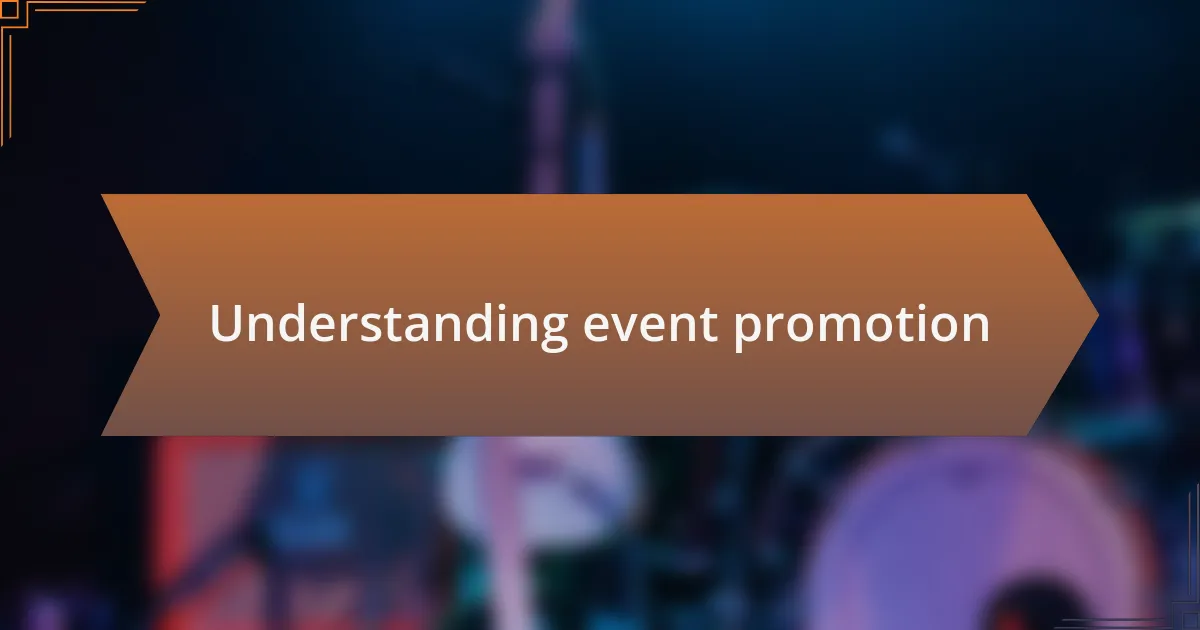
Understanding event promotion
Understanding event promotion is about more than just spreading the word. It’s about crafting a story that resonates with your audience. I often think back to my first event, where I realized that the energy I created around it fueled attendance and engagement. What feelings do you want your audience to associate with your event?
Effective promotion requires a deep understanding of your target demographic. I recall planning an event aimed at young professionals; we used platforms like Instagram and LinkedIn to reach them directly. It became clear that connecting through the right channels significantly boosted our attendance. How can you leverage your unique audience for greater impact?
Don’t overlook the importance of authenticity in your messaging. I once organized a charity event, and I shared personal reasons for supporting the cause in all promotional materials. The response was overwhelming, showing me that when people connect emotionally with your message, they are more likely to join in. What personal story can you share that will make your event feel more relatable?
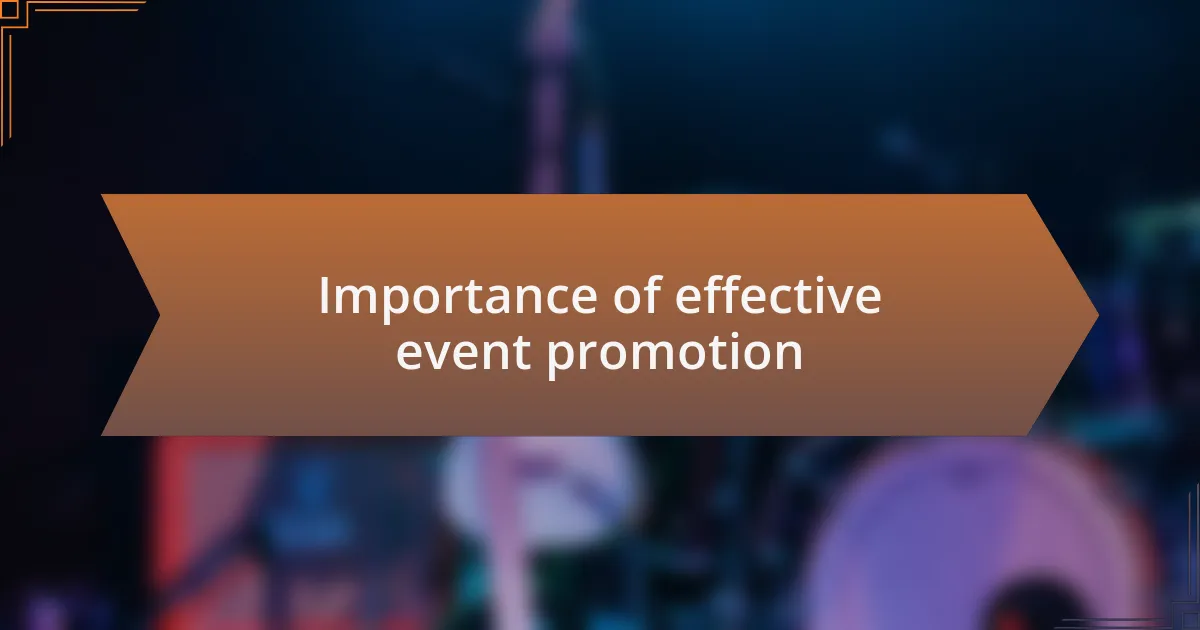
Importance of effective event promotion
When it comes to event promotion, the stakes are high. I’ve seen firsthand how effective promotion can transform an ordinary event into a must-attend experience. For instance, during a community festival I coordinated, we crafted a series of engaging teasers that built anticipation weeks in advance, drawing in crowds eager to participate. Have you ever felt that buzz before attending an event? That’s the power of effective promotion.
The right promotion can create a sense of urgency and exclusivity that is hard to replicate. I remember launching a ticket early-bird campaign for a workshop I hosted, incentivizing early sign-ups. Not only did this create excitement, but it also allowed us to gauge interest and make necessary adjustments before the event. What strategies can you implement to create that sense of urgency for your audience?
Building a strong promotional strategy helps cultivate relationships within the community. I often collaborate with local influencers who authentically align with my event’s purpose. When they share the event with their followers, I notice a significant uptick in interest and trust. Have you considered how partnerships can amplify your event’s reach?
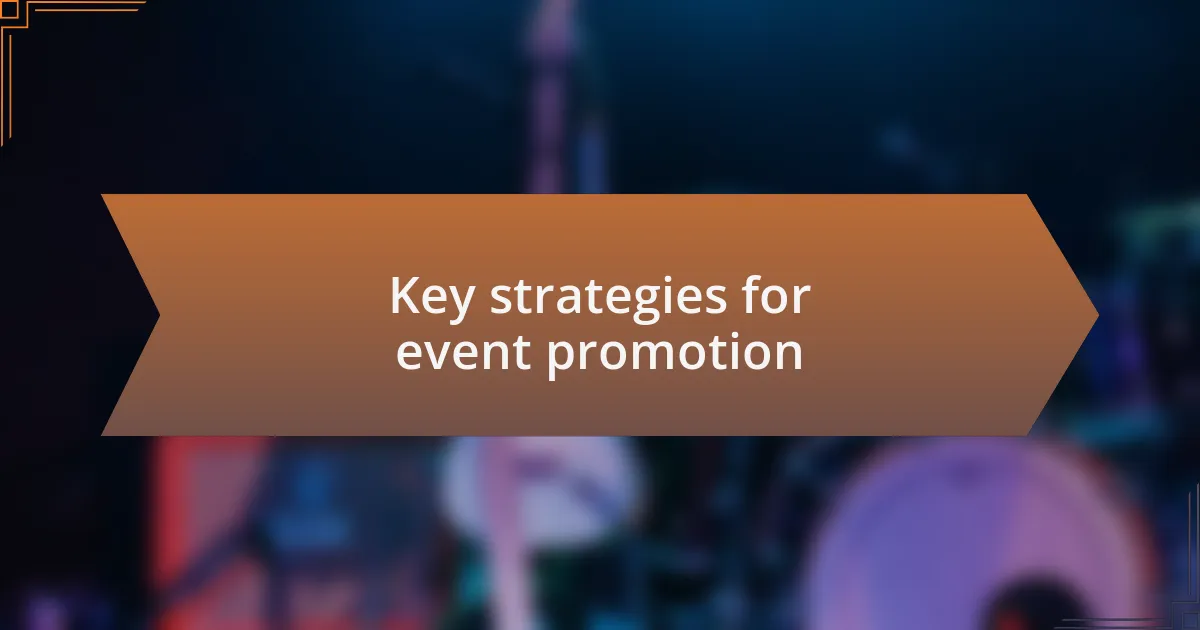
Key strategies for event promotion
One of the most effective strategies I’ve found is leveraging social media platforms to engage potential attendees long before the event date. For instance, I once created content that allowed followers to vote on certain event details, such as themes or activities. This not only generated excitement but also made the audience feel like they had a stake in the event. Have you tried involving your audience in the planning process?
Email marketing is another potent tool in my promotional arsenal. A well-crafted, visually appealing newsletter can create a direct line of communication with your audience. I recall sending out a series of countdown emails for an upcoming conference, each revealing a little more about speakers and sessions. The feedback was overwhelmingly positive. How can you utilize email to keep your audience informed and engaged?
Finally, consider the impact of storytelling as a promotional strategy. I often share personal anecdotes related to the event’s theme, creating a narrative that resonates with potential attendees. For example, I once narrated a heartfelt story about the inspiration behind a charity gala, illustrating its significance. This connection not only draws people in but also fosters a sense of community around your event. What stories can you tell to make your event more relatable?
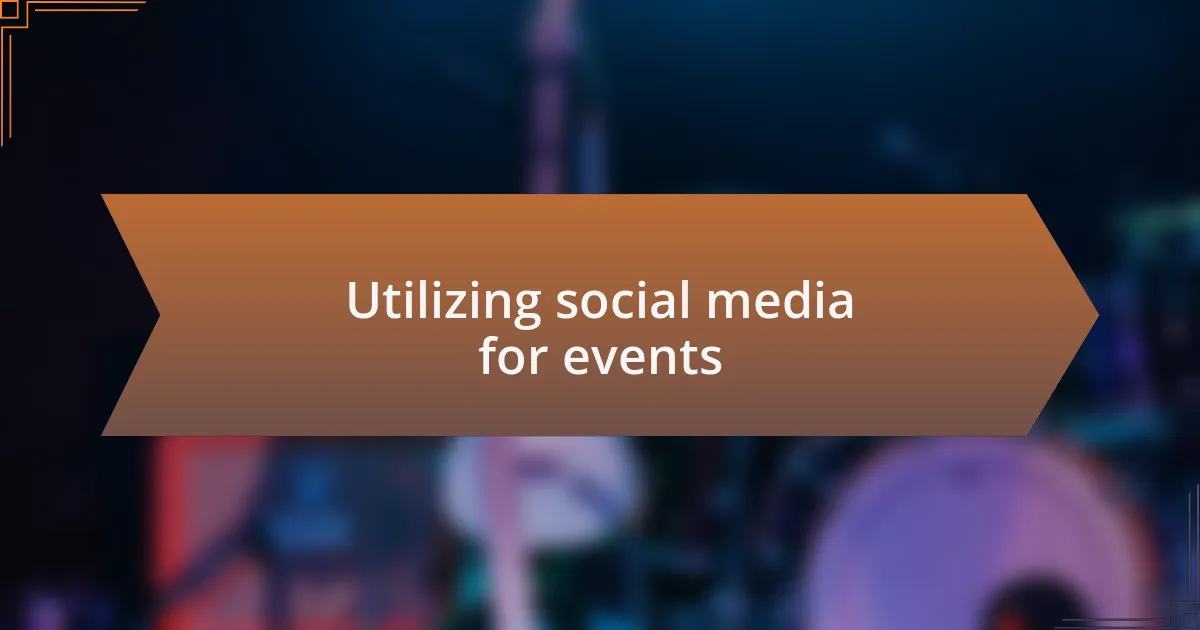
Utilizing social media for events
Utilizing social media for events is a game changer in today’s digital landscape. I learned this firsthand when I organized a local festival where I created event-specific hashtags. Participants started sharing their own photos and experiences, making the event feel alive even before it began. Have you considered how your attendees can contribute to the event narrative?
Additionally, I discovered that live streaming snippets from the planning process can create a buzz. During one event, I went live to reveal behind-the-scenes preparations, which not only built anticipation but also humanized the event’s production team. This transparency can foster trust and excitement—how can you share your event’s journey with your audience?
Finally, I’ve found that engaging with attendees directly through comments or direct messages can build a community around the event. After hosting a workshop, I spent time responding to questions and feedback on social media, which led to a remarkable increase in ticket sales for the next one. Have you taken the time to connect with your audience on a personal level?
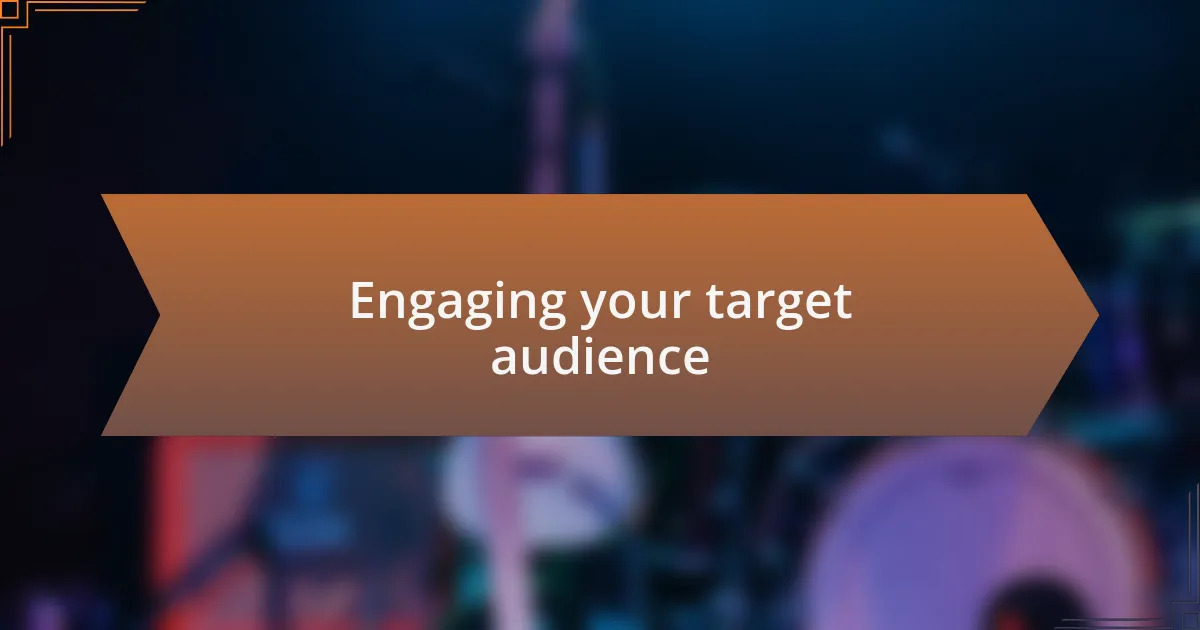
Engaging your target audience
Engaging your target audience starts with understanding their interests and preferences. In my experience, I once conducted a survey before an event, asking potential attendees what topics they were most excited about. The responses were eye-opening; not only did I tailor the event content accordingly, but it made attendees feel valued and heard. Have you thought about how feedback could shape your event planning?
Incorporating interactive elements can elevate the engagement factor significantly. At a recent seminar, we introduced live polls and Q&A sessions to involve the audience actively. The energy in the room changed instantly—people were not just passive listeners; they became part of the conversation. How can you transform your audience from spectators into participants?
Lastly, storytelling is a powerful tool in connecting with your audience. When I shared a personal story related to the event theme, I noticed a palpable shift in atmosphere; attendees felt more connected to the content and each other. It made them laugh, reflect, and truly engage with the event. Have you considered the impact your own stories could have on your audience?
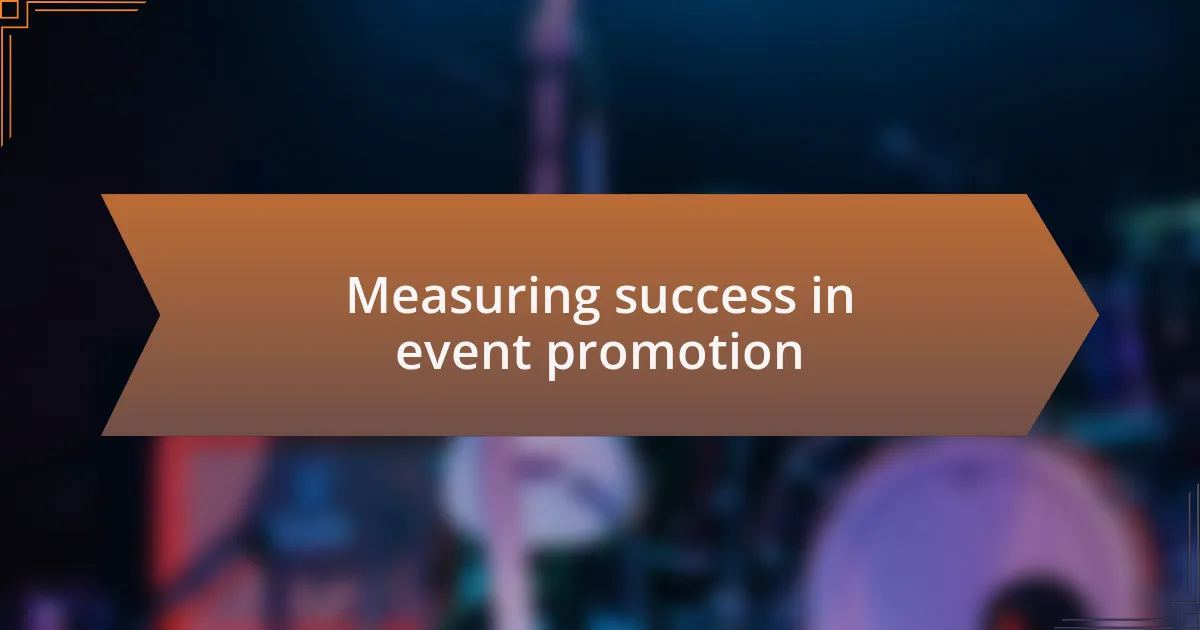
Measuring success in event promotion
To truly measure success in event promotion, I focus on key metrics such as attendance rates and audience engagement. After hosting a workshop last year, I analyzed how many of the registered participants actually showed up. Surprisingly, we had an 80% turnout, which reinforced the effectiveness of my promotional strategy. Have you ever looked into your event’s attendance percentage to gauge its appeal?
Another crucial aspect is the feedback collected post-event. I typically send out a brief survey asking attendees what they enjoyed most and what could be improved. This feedback is invaluable; last time, several participants highlighted the networking opportunities I hadn’t initially emphasized in my promotions. How often do you incorporate feedback into your promotional plans?
Lastly, monitoring social media engagement can provide significant insights into your event’s reach and impact. After promoting my last event online, I noticed a surge in hashtags and shares, which made me realize how much people enjoyed it. Did you know that higher engagement on social media often translates to increased attendee satisfaction? Understanding these connections helps me create better promotional strategies in the future.
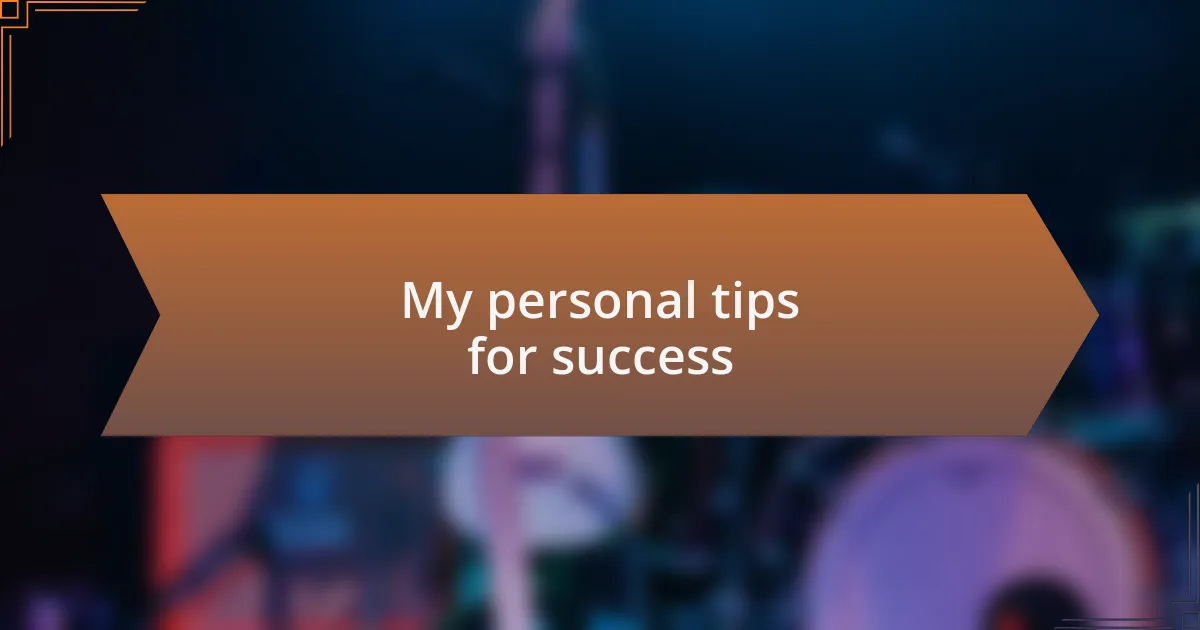
My personal tips for success
When it comes to event promotion, I’ve learned that authenticity resonates with potential attendees. For instance, during a recent fundraising event, I shared my own journey and connection to the cause in promotional materials. The response was overwhelming—people appreciated the personal touch and felt more compelled to join. Have you ever thought about how your own story could enhance your promotional efforts?
Building relationships also plays a pivotal role in my success. I remember reaching out personally to past attendees before my latest conference, inviting them to share their experiences on social media. Not only did this create buzz, but it also made those individuals feel valued and connected to the community. Have you taken the time to personally engage with your audience in a meaningful way?
Lastly, I can’t emphasize enough the power of creating enticing visuals. I once collaborated with a talented graphic designer to develop eye-catching posters and social media images for an event. The improved visuals captured attention and reflected the event’s spirit, which led to a noticeable increase in registrations. What strategies have you employed to visually engage your audience?